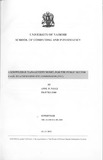| dc.contributor.author | Njagi, Anne W | |
| dc.date.accessioned | 2013-02-19T08:52:41Z | |
| dc.date.issued | 2012 | |
| dc.identifier.citation | Masters of science in computer science | en |
| dc.identifier.uri | http://erepository.uonbi.ac.ke:8080/xmlui/handle/123456789/10226 | |
| dc.description.abstract | This study analyses existing Knowledge Management frameworks and assesses
components necessary to develop and sustain an effective KM in organizations in the
Public Sector. There is a wide array of knowledge content that depends on specific
functions of government. The Public Sector can leverage efficiencies across all public
services through accessing the right information for making informed decisions and
eliminate duplication of effort.
Teachers Service Commission (TSC) has been mandated by the Kenya
Constitution to carry out the Teacher Management function for all public educational
institutions. Smooth information flow and communication is crucial for effective decision
making. Inadequate information access due to information storage challenges is a major
problem that hampers proper service delivery at all levels within the TSC. The objective of
this study was to recommend a knowledge-oriented organizational model for TSC, which
would efficiently manage its intellectual and knowledge assets and improve information
flow.
The methodology used, which was qualitative research, was done from document
review sourced from primary and secondary sources as well as similar organization best
practice in Knowledge Management. The Common KADS model was used to analyze the
knowledge structure by distinguishing specific knowledge types and roles. The real needs
of the Commission as a case study within the Public Sector were gathered through a
knowledge mapping exercise. The analytical methods used included grounded theory,
thematic narrative, participant observation (ethnography) and content analysis.
Results from findings revealed that information access, process based knowledge
(organization memory), structured knowledge sharing forums, clear rewarding
mechanisms, mentoring practice and commitment towards knowledge creation were
ranked highly among managers for effective decision making. The study therefore
proposes a KM relational framework/ model integrated with the decision making
framework as an implementation strategy. This will ensure an embedded knowledge
sharing culture‘ within TSC and the Public Sector for improved service delivery. | en |
| dc.language.iso | en | en |
| dc.publisher | University of Nairobi | en |
| dc.subject | knowledge management model | en |
| dc.subject | public sector | en |
| dc.subject | teachers service commission (tsc) | en |
| dc.title | A knowledge management model for the public sector case: Teachers Service Commission (TSC) | en |
| dc.type | Thesis | en |
| local.publisher | School of Computing and Informatics | en |

